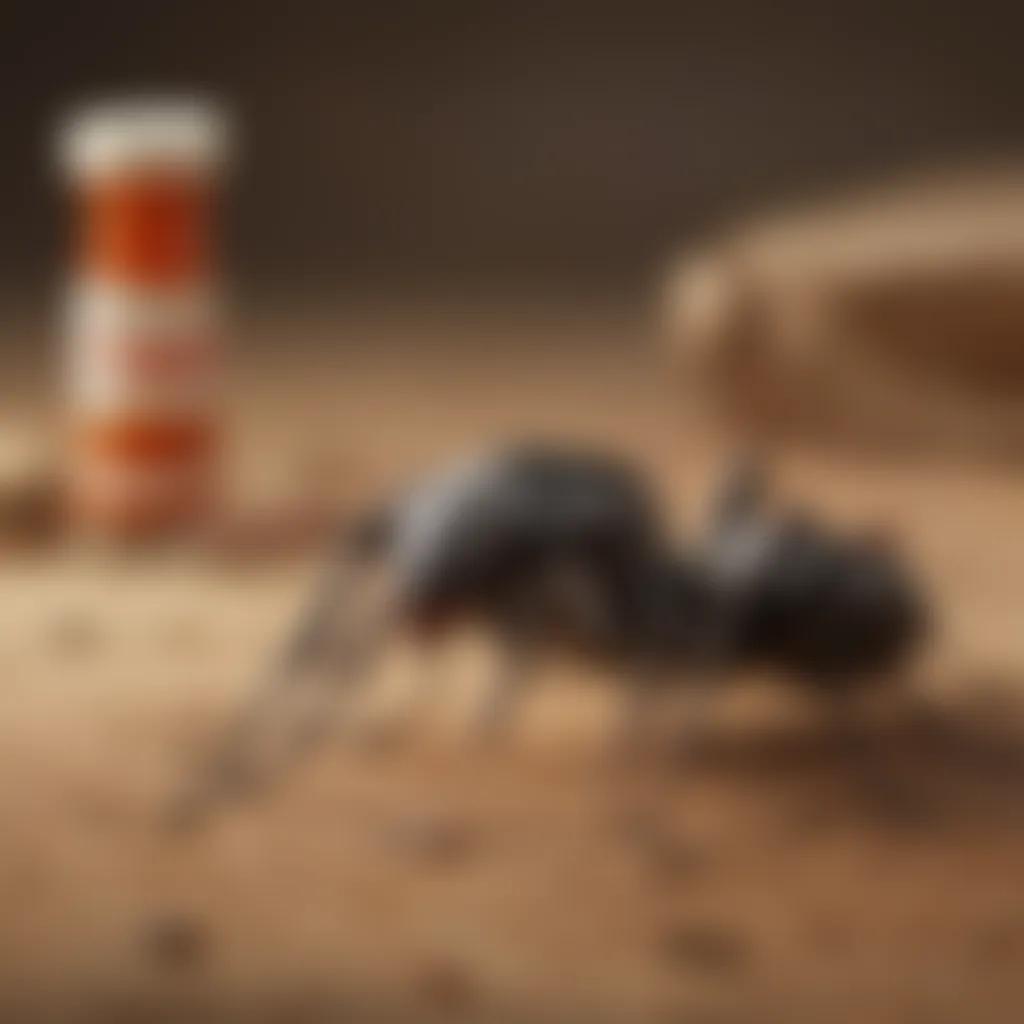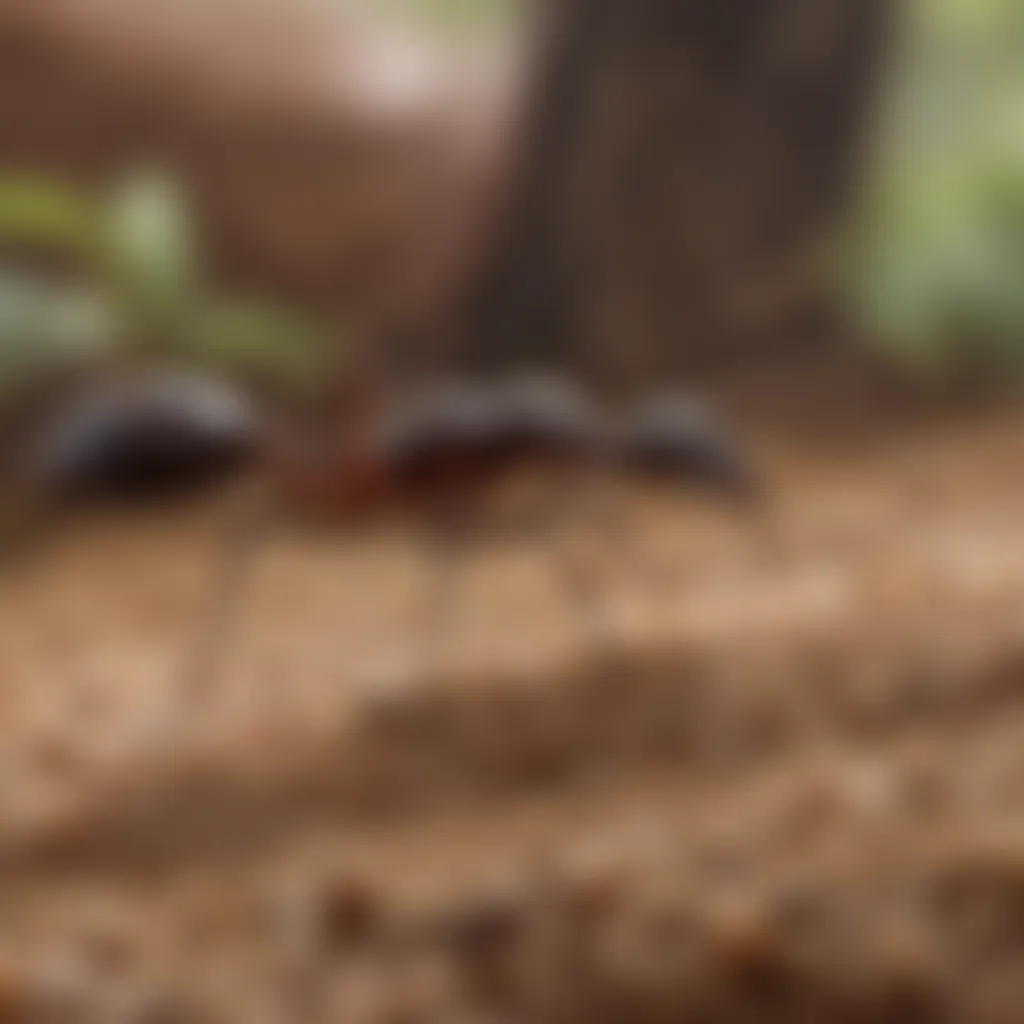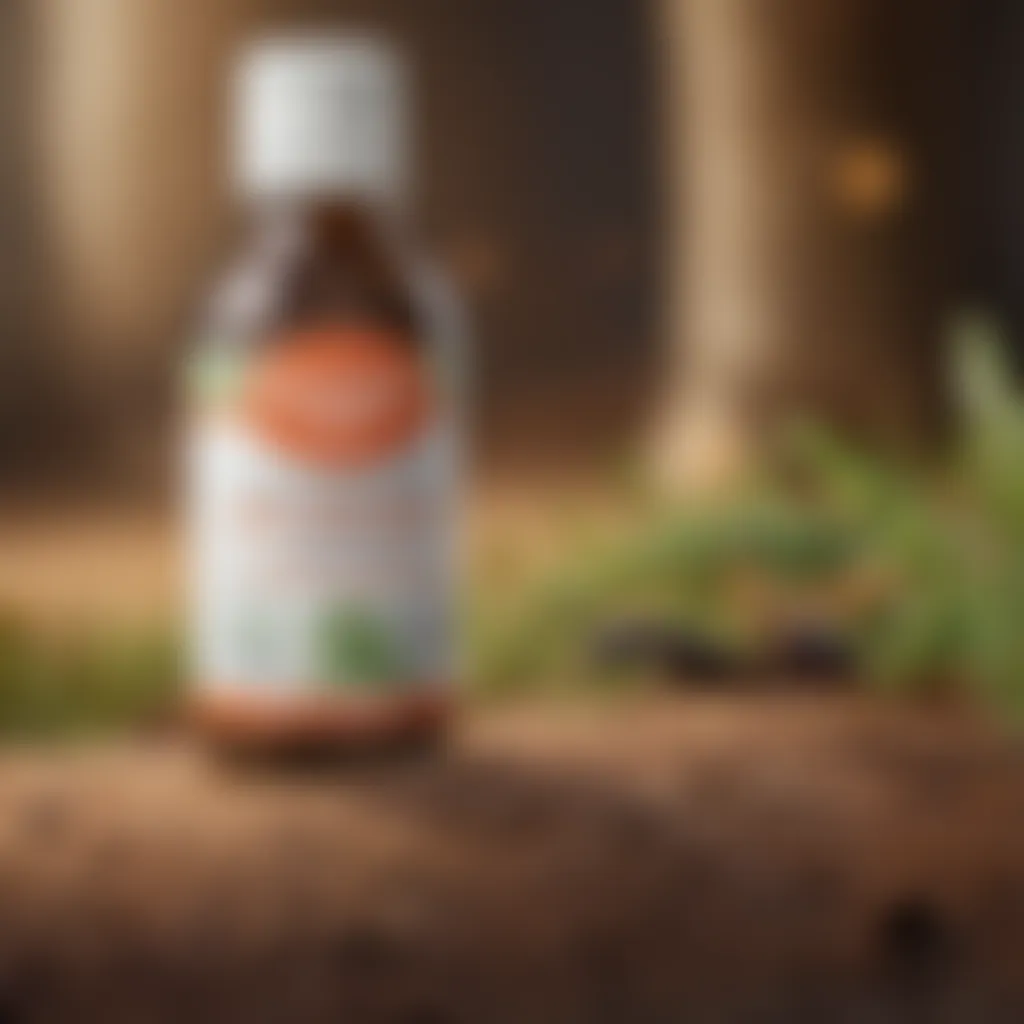Natural Ant Killer: Safe and Effective Home Solutions


Intro
Dealing with ants at home can be quite the nuisance. These tiny creatures might seem harmless, but when they invade your kitchen or pantry, they can turn your cozy sanctuary into a battleground. Rather than resorting to harsh chemicals that could pose risks to your family and pets, many are turning towards natural solutions. This shift has created a growing demand for eco-friendly pest control methods that not only tackle the problem but also protect our living spaces.
Understanding the behavior and habits of ants is crucial in formulating effective strategies for elimination and prevention. Ants are social insects that work in colonies, often seeking food sources and establishing trails to return to them. This innate behavior can be leveraged to use natural substances that repel or trap these pesky invaders without harming the environment.
In this guide, we explore an array of natural ant control methods. By marrying knowledge with practical application, you can create a pest management plan that is both efficient and safe for your home. Get ready to dive into the world of natural ant killers and open the doors to a chemical-free way of maintaining your space.
Prelude to Natural Ant Control
In an age where people are becoming more aware of the impact of chemicals on health and the environment, the need for natural ant control has never been more pressing. Ant infestations can be persistent nuisances that disrupt our domestic spaces. Tackling this challenge effectively not only helps maintain a comfortable home but also promotes a healthier living environment for family members and pets.
Natural ant control methods focus on repelling and managing ant populations without relying on harsh pesticides. This approach can save homeowners not only from potential hazards associated with synthetic chemicals but also from financial burdens incurred through professional pest control services. In essence, understanding how to manage ant populations naturally empowers homeowners, giving them tools to take back their space.
Ants are not just mere annoyances; they play important ecological roles. However, when they invade our homes, effective, yet safe, control methods become essential.
Understanding the Challenge of Ant Infestations
Dealing with ants can sometimes feel like a full-time job. These tiny pests infiltrate homes seeking food and shelter, often forming lines that seem to appear from nowhere. The challenge lies not just in their sheer numbers but also in their impressive organizational skills. Ants can navigate through the tiniest cracks, exploit weaknesses in our defenses, and multiply rapidly if given the right conditions.
Commonly found species such as the Argentine ant or carpenter ant can wreak havoc. Each species has its particular habits, making it crucial for homeowners to recognize the specific ant they're up against. For instance, while some may be attracted to sugary treats, others might have a preference for greasy sources. This means the methods for managing them must be tailored to their specific behaviors. Recognizing these patterns can help in designing successful strategies for ant control.
Criteria for Effective Ant Control Solutions
When assessing natural ant control options, several criteria should guide selection:
- Safety for Humans and Pets: Any method chosen should pose minimal risk to family and pets. Natural solutions help here, as they tend to be non-toxic in comparison to synthetic chemicals.
- Effectiveness: The solution should not only deter ants but also prevent new colonies from forming. It’s about addressing not just the symptom but also the root of the problem.
- Environmental Sustainability: Using materials that are biodegradable and have a low impact on ecosystems is paramount. This ensures that other non-target species aren't adversely affected while combatting pest problems.
- Cost-Effectiveness: Solutions should be economically viable. Many natural methods can be made from common household ingredients, which minimizes costs.
- Ease of Implementation: Homeowners need methods that are straightforward to execute, requiring minimal effort and time.
Choosing the right method involves not just considerations of effectiveness but also the broader implications for one's home and environment. The goal is a sustainable approach to pest management that reflects conscientious living.
Biology and Behavior of Ants
Understanding the biology and behavior of ants is pivotal for anyone looking to manage their presence effectively within a home. Knowledge of these tiny creatures not only helps us to recognize their habits and preferences but also allows for the development of targeted strategies that can make control measures much more effective. By dissecting the intricate workings of an ant colony, we can customize our approaches, using natural methods to mitigate their presence without resorting to harmful chemicals.
Species Commonly Found in Homes
Several ant species tend to make their home in ours, each with unique characteristics and behaviors. Here are a few that are often spotted invading domestic spaces:
- Carpenter Ants: These are larger ants, known for nesting in wood. Their presence often indicates moisture damage in wooden structures, so it’s best to address any leaks or decay promptly.
- Argentine Ants: Small and brownish, these ants are notorious for forming large colonies. They can quickly take over a space due to their strong attraction to sweets and proteins.
- Pharaoh Ants: These light yellow creatures prefer warm and humid environments. They can be quite problematic in kitchens and healthcare facilities, as they easily infest food and medical supplies.
- Odorous House Ants: Named for the strong odor they emit when crushed, these ants are often found in homes seeking sugary foods. They have a propensity for taking advantage of cracks in structures.
Identifying which species you're dealing with can guide your control methods. Knowing their target foods and nesting habits helps in prevention and treatment.
Ants' Social Structure and Communication
Ants are social insects that thrive in organized colonies, which can range from a few dozen individuals to millions. This structure is significant because it influences how they behave and respond to your efforts for control. Each member of the colony has a role, from the queen who reproduces to workers who gather food and care for the young.


Ant communication revolves around pheromones, which are chemical signals. For instance, when a worker ant finds food, it leaves a pheromone trail back to the nest, prompting others to follow. Thus, when trying to deter ants naturally, it’s wise to disrupt these trails. Some methods include:
- Using vinegar solutions: The strong scent masks their pheromone trails, effectively confusing them.
- Utilizing essential oils: Spraying peppermint or tea tree oil disrupts their communication and makes the area less inviting.
"Disruption of ant communication is a key strategy in natural pest control, as it hampers their ability to eat and reproduce."
Feeding Preferences and Habitat
Ants are opportunistic feeders with a varied diet that commonly includes sweets, proteins, and fatty substances. Understanding what ants are after can make all the difference in controlling them effectively. Some species are drawn to:
- Sugary substances: Found in common kitchen items like honey, syrup, and even fruit.
- Greasy foods: Such as peanut butter or meat scraps, are particularly attractive to many ant types.
- Protein sources: Often sourced from dead insects or pet food left out.
In terms of habitat, ants can adapt to numerous environments but often favor areas that provide easy access to food and moisture. Common nesting sites include under rocks, in wood, and within walls. Keeping your living space clean and sealing entry points is essential to reducing their attraction.
To sum it up, addressing the biological and behavioral characteristics of ants enables you to better fortify your home against these resilient pests. With an understanding of their nesting habits, social structures, and dietary preferences, prioritizing your pest control methods becomes far more strategic and effective. This natural approach not only safeguards your home but does so in a way that is both safe for the environment and beneficial for your family.
Natural Repellents
Natural repellents play a vital role in managing ant populations within homes. These methods emphasize the use of non-toxic and eco-friendly substances, making them preferable for households concerned about safety and environmental impact. The importance of utilizing these natural solutions lies not only in their effectiveness against ants but also in their minimal risk to humans and pets. Furthermore, many of these options are often easily available in most kitchens or local stores, offering convenience along with their pest control capabilities.
Choosing natural repellents also entails understanding the specific characteristics that make them effective. Knowing the individual properties of these substances can empower homeowners to implement them with precision. Each natural repellent comes with its own set of advantages and considerations, making it imperative for readers to grasp the nuances that could determine their success.
Essential Oils as Ant Deterrents
Essential oils are some of the most popular natural repellents due to their potency and pleasant scents. Various oils can repel ants effectively, each acting on different sensory cues that ants use in their foraging behavior.
Peppermint Oil
Peppermint oil stands out among essential oils for its strong menthol scent, which is particularly disruptive to ants. Its high concentration of menthol serves a dual purpose, acting not just as a repellent but also as an irritant to many pests. One significant advantage of peppermint oil is its natural origin, making it appealing to those who shun synthetic chemicals. However, it should be noted that while it effectively deters ants, its effects may need to be reapplied frequently, especially after rain or cleaning.
Lemon Oil
Lemon oil has a refreshing citrus scent that is more than just pleasant; it’s effective against ants as well. The natural acidity in lemon can disrupt the pheromone trails that ants leave behind, confusing them and making it hard for them to navigate. This property can be particularly advantageous when dealing with large infestations. Its eco-friendly nature is a draw, though some may find its scent overly strong when used in larger quantities.
Tea Tree Oil
Tea tree oil is known for its antimicrobial properties, which extend to its use as an ant repellent. This oil not only helps in keeping ants away but also contributes to cleanliness, acting against other household pests. One unique feature is its more potent and earthy aroma, which some might find less appealing. While it’s been praised for its effectiveness, it can be more expensive than other oils, which may be a deterrent for some households.
Vinegar Solutions for Ant Control
Vinegar is often regarded as a household staple for cleaning and disinfecting, but its effectiveness in pest control shouldn't be overlooked. The high acidity of vinegar disrupts ant pheromones and acts as a barrier that ants will avoid. To create a vinegar solution, mixing equal parts of vinegar and water can yield a formidable spray that targets ant trails and entry points. Not only does it deter ants, but it also leaves a clean surface behind, serving two purposes at once. One thing to keep in mind is that while vinegar can repel ants, it may not effectively eliminate an entire colony, necessitating a combination of methods for comprehensive control.
Natural Powdered Repellents
Natural powdered repellents can also be formidable allies in the battle against ants, providing an alternative to sprays and oils. These powders offer ease of use and can target ants directly where they travel.
Cinnamon


Cinnamon is not just a spice; it’s a reliable ant deterrent that can easily be sprinkled around entry points. Its key characteristic is the presence of a compound called cinnamaldehyde, which disrupts ants' ability to smell and navigate. Many find this method appealing due to its pleasant aroma and culinary uses. However, it may require consistent application, especially in areas prone to heavy ant traffic.
Diatomaceous Earth
Diatomaceous earth is a fine powder made from the fossilized remains of tiny aquatic organisms. It serves as a mechanical insecticide, causing dehydration upon contact with pests. Ants walking over this powder will experience serious desiccation, making it a highly effective choice. The unique aspect of diatomaceous earth is its safety for humans and pets, offering an eco-friendly way to combat ants. Yet, it's important to use food-grade diatomaceous earth, as non-food-grade types can contain harmful additives.
Traps and Baits
When it comes to controlling ant populations, traps and baits stand out as effective methods for those seeking natural solutions. They not only target ants specifically but also allow for more controlled and discreet pest management. Relying solely on repellents might keep ants away temporarily, but without an effective trap, they often find ways to return. In contrast, traps and baits can work more strategically by attracting and eliminating the ants that invade your home.
Homemade Ant Baits
Boric Acid and Sugar Bait
One of the most effective homemade baits is the Boric Acid and Sugar Bait. This duo combines the irresistible sweetness of sugar with the slow-acting toxicity of boric acid. Sugar attracts the ants, while boric acid gradually disrupts their digestive systems. So, why is this bait considered a beneficial option? The slow-acting nature of boric acid ensures that it not only takes out the ants that consume it but also allows for the bait to be carried back to the colony, affecting more ants in the process.
A unique feature of the Boric Acid and Sugar Bait is its low toxicity to humans and pets when used in proper measures. While it can be effective, it is critical to keep it out of reach of children and animals. One downside is the need for patience; it won’t work overnight, but the result can be substantial if the ants get the bait in their systems before realizing their mistake.
Peanut Butter Bait
Another popular option among homemade traps is Peanut Butter Bait. Known for its viscous texture and strong aroma, peanut butter draws in a wide variety of ant species. Ants find it enticing, making it a fantastic choice for those who know that ants love protein and fat. The ease of access and the satisfying spreadable consistency of peanut butter enables a simple application on various baits.
What makes the Peanut Butter Bait stand out? Its immediate effectiveness is often highlighted, as ants can find it and start reporting back to their colonies quickly. However, there are some hurdles too. Unlike boric acid, it doesn’t have the same toxic properties, which means you might see ants return if you don’t use it alongside a more potent solution.
Using Yeast and Sugar Solutions
Another intriguing option for homemade baits is the Yeast and Sugar Solution. This bait capitalizes on ants’ attraction to sweet scents but aims at deceiving them into a trap. Yeast ferments and produces carbon dioxide, which can attract ants, while the sugar gives them an additional reason to head straight to the bait.
The simplicity of this solution is one of its appealing characteristics, as it only requires mixing a bit of sugar with a tiny amount of yeast in water to create a syrupy mix. Moreover, there are no complex chemicals involved. However, one must keep in mind that this bait doesn't act as effectively as others; ants might not bring it back to the colony as quickly, thus prolonging the control time.
In home pest control, understanding the nuances of different traps and baits is crucial. Doing so can make all the difference between a minor nuisance and a full-blown infestation.
Preventive Measures
In pest management, especially regarding ants, prevention often proves to be the unsung hero of effective control. A solid preventive strategy not only minimizes the chances of an infestation but also reinforces the overall health and hygiene in the home. By understanding ants and taking proactive steps, homeowners can maintain a space that discourages these unwanted guests.
Maintaining Cleanliness at Home
A clean home is the first line of defense against ants. These pests are attracted to food particles and spills, making cleanliness paramount. Regularly sweeping floors, wiping down countertops, and keeping food sealed in airtight containers can deter the curious and hungry ant. It’s crucial to pay special attention to areas like kitchens and pantries where crumbs can accumulate. For example, after dinner, do the dishes promptly and inspect those hidden nooks and corners where crumbs might linger.
Here are some key steps for maintaining cleanliness:
- Regular Sweeping and Mopping: Regularly remove debris by sweeping and periodically mopping floors, especially in dining areas and kitchens.
- Seal Food Properly: Store all food, including pet food, in airtight containers.
- Empty Garbage Regularly: Dispose of trash daily to avoid any buildup of odors that may attract ants.
- Clean Up Spills Immediately: Address spills right away rather than letting them sit, as they can become a beacon for ants.
Taking these precautions can drastically reduce the chances of an ant problem developing. Not only does this help keep ants at bay, but it also contributes to a fresh and healthy living environment.
Sealing Entry Points


Ants are adept travelers, slipping through the tiniest of openings. Once they find a way in, they often establish a route to food sources and create colonies. Sealing entry points is, therefore, an essential preventive measure anyone can take to safeguard their home. Assessing your property for potential entries can seem daunting, but it’s an investment in peace of mind.
To tackle this task:
- Inspect Perimeters: Conduct a thorough inspection of the house's exterior—look for cracks in walls, gaps around windows, and spaces near doors.
- Use Caulk and Sealants: Apply caulk to small cracks or openings. For larger gaps, weather stripping can be a practical solution.
- Keep Landscaping Tidy: Trim shrubs and trees near the house, as they can provide a bridge for ants to gain access.
- Check Utility Lines: Look for gaps around pipes and wires, as they can allow entry. Use foam insulation to seal these.
By ensuring the house is sealed tight against pests, you're not just dealing with ants but also preventing other critters from moving in. Each small effort contributes to the bigger picture of home protection.
"Stitch in time saves nine." With preventive measures, staying ahead of infestations can spare you from larger problems down the road.
Environmental Considerations
When it comes to addressing ant infestations, the environmental considerations cannot be overlooked. As more people opt for natural methods over chemical pesticides, it becomes essential to focus on the broader impact these solutions have on our ecosystems. The importance of taking a step back to understand how our pest control methods fit into the environment is crucial. It's not just about getting rid of ants; it's about doing so responsibly, preserving the intricate balance of life that exists around us.
By utilizing natural solutions, homeowners can effectively tackle their ant problems while also being stewards of the environment. Here are some key aspects regarding the sustainability of these methods:
Sustainability of Natural Solutions
Natural ant killers often focus on substances that are less harmful than their chemical counterparts. When selecting pest control methods, consider the following benefits:
- Biodegradability: Many natural repellents break down more easily in the environment compared to synthetic chemicals, meaning they leave less of a lingering footprint. For instance, ingredients like vinegar and essential oils are not only effective but also safe for the environment.
- Lower Toxicity: Natural solutions tend to have lower toxicity levels for humans and pets. Using peppermint oil or cinnamon as deterrents can safeguard small children or pets who might accidentally ingest them.
- Local Resources: Many natural solutions can be made with materials readily available in your own home, reducing the need for purchasing specialized pest control products. This not only saves money but also minimizes packaging waste.
By embracing sustainable practices, you contribute to a cleaner, healthier planet while maintaining control over pest populations in your home.
Impact on Non-Target Species
One of the substantial advantages of natural ant control methods also lies in their impact on non-target species. Understanding this impact is essential for maintaining biodiversity within your home and surroundings. The use of harsh chemicals often leads to unintended consequences, harming beneficial insects and other wildlife that may not be the target. Here’s what you need to know:
- Preservation of Beneficial Insects: Natural repellents generally do not affect species like bees or ladybugs, which are vital for pollination and pest control. For example, using diatomaceous earth can trap ants while preserving the populations of other beneficial insects.
- Ecosystem Balance: Utilizing harmful chemicals can disrupt the balance of local ecosystems. When only specific pests are targeted, a cascading effect might change predator-prey relationships, leading to an overpopulation of other pest species.
- Transparency and Accountability: Being aware of the impact of your pest control measures promotes an eco-friendly mindset. Consider researching how various solutions align with the health of the soil and nearby flora when implementing your methods.
"Keeping your home ant-free doesn't have to come at the expense of the environment. By opting for natural solutions, you’re doing your part in fostering a thriving ecosystem."
Ending and Final Thoughts
As we wrap up our exploration into natural methods of ant control, it's vital to recognize the importance of evaluating the various strategies available. This final section sheds light on how these methods not only serve to eliminate ant problems but also align with a broader aim of maintaining a healthy and sustainable home environment.
Evaluating the Effectiveness of Methods
When assessing how well natural ant control methods work, several factors come into play.
- Efficiency: Are these methods achieving noticeable results? It’s important to monitor ant activity before and after implementing any strategy. For example, using a mixture of boric acid and sugar might lure ants away while effectively targeting their colonies.
- Safety: A cornerstone of natural pest control is ensuring that the methods used don’t pose risks to residents or pets. Unlike chemical sprays, natural repellents often harness essential oils or everyday household items that are less harmful.
- Sustainability: Concentrating on eco-friendly practices not only addresses immediate pest problems but contributes to long-term planetary health. Using ingredients like vinegar or cinnamon has shown that effective pest management can coexist with environmental consideration.
Future Directions in Natural Pest Control Research
Interestingly, as homeowners increasingly turn to natural solutions, there’s a growing need for deeper research into these methods. Future studies could focus on the following areas:
- Ingredient Efficacy: Delving deeper into how specific natural substances impact various ant species could lead to more targeted strategies. For instance, while we understand that peppermint oil may repel certain ants, identifying its effectiveness across diverse species is crucial.
- Combination Approaches: Evaluating how different natural deterrents work together may open new avenues for pest control. For example, blending vinegar with a few drops of tea tree oil could enhance the overall effectiveness in repelling ants.
- Long-term Studies: Understanding the long-term impact of these natural methods is essential. Research could explore how sustainable practices shape ant populations over time within domestic environments.
Overall, the future of natural pest control is promising. As residents prioritize safe methods, ongoing research will empower them to engage with nature rather than combat it, yielding a more balanced relationship with our ecosystem.
"Embracing natural pest control is not just about eradicating ants; it’s about coexisting harmoniously with our environment."
In summary, as we navigate the complex landscape of pest management, ensuring that both our homes and the planet remain in good shape should be at the forefront of our solutions. By striving for effective, safe, and sustainable methods, we not only tackle our immediate concerns but contribute meaningfully to the world around us.







